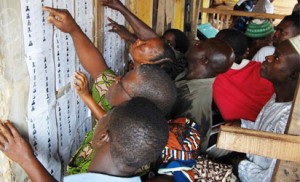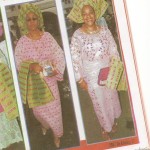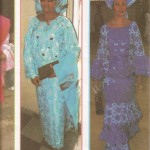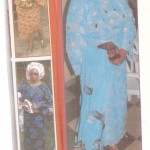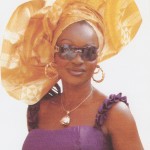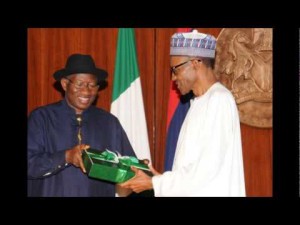Ni ìgbà àtijọ́, ọkùnrin kan wa ti orúkọ rẹ njẹ́ Ìgbéraga. Wọ́n bi Ìgbéraga si ilé olórogún, àwọn ìyàwó bàbá́ rẹ yoku ni ó tọ nitori ìyá rẹ kú nigbati ó wà ni kékeré. Lẹhin ti o tiraka lati pari iwé mẹ́fà, gẹ́gẹ́ bi ọ̀dọ́, ó gbéra lọ si ilú Èkó nibiti ó ti bẹ̀rẹ̀ iṣẹ́ pẹ̀lú ilé-iṣẹ́ Ẹlẹ́ja.
Ó nṣe dáradára ni ibi iṣẹ́ ki ó tó gbọ́ ìròyìn ikú bàbá rẹ. Ìgbéraga pinu lati padà si ilú rẹ lati gba ogún ti ó tọ́ si lára oko kòkó rẹpẹtẹ ti bàbá rẹ fi silẹ̀. Ohun fúnra rẹ ra oko kún oko bàbá rẹ ti wọn pín fun. Ó di ẹni ti ó ri ṣe ju àwọn ọmọ bàbá rẹ yoku. Eyi jẹ ki gbogbo àwọn ọbàkan rẹ gbójú le fún ìrànlọ́wọ́.
Ni igbà ti ó yá, o ni ilé àti ọlà ju gbogbo àwọn yoku ni abúlé ṣùgbọ́n kò to, ó bẹ̀rẹ̀ si ra oko si titi dé oko àwọn ọmọ bàbá rẹ yoku. Eyi jẹ́ ki ó sọ àwọn ọmọ bàbá rẹ yoku di alágbàṣe ni oko ti wọn jogún. Inú àwọn ọmọ bàbá rẹ wọnyi kò dùn si wi pé wọn ti di atọrọjẹ àti alágbàṣe fún àbúrò wọn ninú ilé ara wọn.
Yorùbá ni “Àṣejù Baba Àṣetẹ́”. Ìgbéraga bẹ̀rẹ̀ si ṣe àṣejù, kò dúró lati má a fi ọrọ̀ rẹ yangà si gbogbo ará ilú pàtàki si àwọn ẹ̀gbọ́n rẹ, ó jọ ara rẹ lójú, ó si nsọ ọ̀rọ̀ lai ronú tàbi gba ikilọ̀ àwọn àgbà ti wọn mọ ìbẹ̀rẹ̀ rẹ. Kò mọ̀ wi pé ohun ngbẹ́ ikòtò ìṣubú fún ara rẹ́. Ni ọjọ́ kan, ó pe ọ̀kan ninú àwọn ẹ̀gbọ́n rẹ ti ó sọ di alágbàṣe ninú oko rẹ tẹ́lẹ̀ ó si bu, ó pe e ni aláìní dé ojú rẹ. Ẹ̀gbọ́n ké pẹ̀lú omijé lójú pé “Bi ó bá jẹ ìwọ ni Ọlọrun, ma ṣe iwà burúkú yi lọ, ṣùgbọ́n bi ó bá jẹ́ enia bi ti òhun, wà á ká ohun ti o gbin yi”.
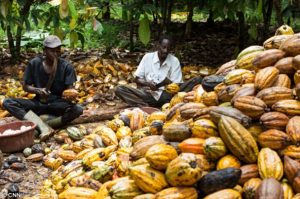
Alágbàṣe ni oko Kòkó ti wọn jogún – Working as Labourers in their inheritted Cocoa farm.
Ni àárọ̀ ọjọ́ kan, Ìgbéraga ji ṣùgbọ́n kò lè di de nitori ó ti yarọ. Wọ́n gbe kiri titi fún itọ́jú ṣùgbọ́n asán ló já si. Ìṣòro yi jẹ ki ó ta gbogbo ohun ini rẹ ti ó fi nyangàn titi o fi di atọrọjẹ.
Ẹ̀kọ́ ìtàn yi ni pe àṣejù ohunkóhun kò dára pàtàki ki enia gbójúlé ọrọ̀ ilé ayé bi ẹni pé àwọn ti ó kù kò mọ̀ ọ́ ṣe, nitori Yorùbá sọ wi pé “kìtà kìtà kò mọ́là, Ká ṣiṣẹ́ bi ẹrú kò da nkan, Ọlọrun ló ngbé ni ga”.
ENGLISH TRANSLATION
In the olden days there was a man named “Igberaga”, he was born into a polygamous home and raised by the other wives of his father because his mother died when he was a child. He migrated to Lagos (a big city) where he joined a Fishing company after struggling through his teenage life and obtaining Primary Six certificate.
He was prospering in his business, while his father died. Igberaga decided to return to his father’s estate to claim his own of his father’s vast Cocoa Plantation. He was able to acquire more plantation beside what was allocated to him as his inheritance. Prosperity smiles on him more than any of his siblings. Many of his half brothers and sisters relied on him for financial support.
After a while, he owned more houses and prospered more than anyone in the community. Beside he continued to acquire more farms, till he acquired his siblings’ inheritance and making them to become tenants. To crown it all, he began to use them as a labourer in the farm they once owned. This did not settle well with his brothers as they were now reclined into beggars in their homes and servants to a younger brother.
According to a Yoruba adage, “Excessive behaviour is the father of Disgrace”. Igberaga engaged in excessive behaviour as he did not stop flaunting his wealth, he was arrogant and flippant at all times, despite warnings from those that know and understand his upbringing. He refused all the warnings by the elders. Little did he know that, he was working towards his doom? One day, he called one of his brothers whom he employed as a labourer, in his original farm and humiliated him because he was poor. The poor brother lamented, by crying out that; “if you are God you go ahead with your plan, but if you are human like me, you will certainly reap what you sow”.
One morning, Igberaga woke up and could not stand on his feet, he became crippled. Many attempts were made to find a cure for his illness but to no avail. This circumstances forced him to sell all his properties and he ended up becoming a beggar.
Lessons from this story teaches that one should not equate wealth with one’s hard work alone, as if the others who are less privileged did not struggle enough. According to Yoruba proverb “Wealth is not by hard labour or slaving away, but it is by God’s blessing”.
Originally posted 2017-03-07 20:16:50. Republished by Blog Post Promoter






